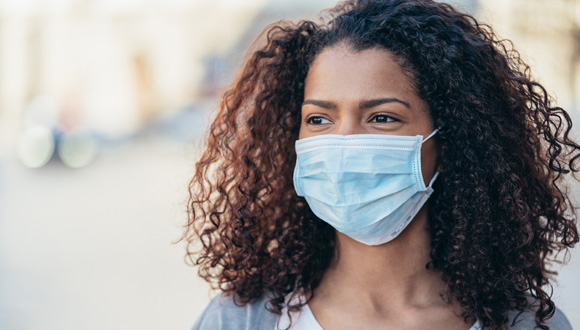Coronavirus & Young Adults: Social Distancing and Self-Quarantining Matters for You, Too
March 20, 2020 - Katie McCallumBy now, you've heard that the new coronavirus that causes COVID-19 will continue to be among us for some time. You've probably also heard that public health officials continue to stress the need for social distancing. Or maybe you haven't.
Social distancing is hard, but it's effective. And it applies to everyone.
If you've seen the news and your response is: "I'm young, I'm healthy, I'll take the risk," — think again.
COVID-19 is here. It's real. It's serious. And none of us are immune.
We don't need to hide away in a bunker with enough toilet paper and hand sanitizer to last a year, but each and every one of us does need to do his or her part in preventing the spread of COVID-19.
Still struggling with what COVID-19 means for healthy young adults? Keep reading.
Our age won't be what keeps us out of the hospital
When the outbreak first began, the initial M.O. of COVID-19 was that it primarily affected the elderly. But the reality is that anyone exposed to the new coronavirus can become infected with it — no matter what age you are. And while it's true that older adults have a higher risk of developing more serious illness and dying from COVID-19, that doesn't mean younger adults can't end up in the hospital or intensive care unit (ICU).
In fact, findings released by the Centers for Disease Control and Prevention (CDC) examining coronavirus cases reported in the U.S. between March 12 through March 16 found that 34% of the cases were people under the age of 45. What's more, of the confirmed COVID-19 cases during that time range, 20% of the people hospitalized and 12% of the people placed in the ICU were adults between the ages of 20 and 44.
These numbers tell us that adults of any age are vulnerable to developing a severe case of this disease — meaning we should all be equally committed to slowing the spread of COVID-19 through social distancing and other preventive measures.
Mild symptoms in one person can cause serious illness in someone else
While it can be tempting to cross our fingers and take our chances when it comes to COVID-19, we need to think about the chances of the people we might spread the virus to if we do get infected.
Coronavirus is primarily spread from person-to-person through the respiratory droplets of an infected person's cough. By the way, did you know that a cough can shoot respiratory droplets as far as six feet away from you? With that in mind, it's clear how easy it is to spread coronavirus — without ever meaning to.
Let's take the hypothetical that one of us gets infected. Scan the six-foot perimeter around you right now. Every person you see is someone you could potentially infect, and every surface is one you could potentially contaminate.
And even if you're only experiencing mild to moderate symptoms, others might get really sick. Remember that 20% of people between 20 and 44 that ended up in the hospital? That could be your spouse, your friend, your coworker, that guy who takes your coffee order every single morning or maybe even your neighbor who drives you nuts but you'd never wish serious illness upon.
Then there's also the possibility that you infect someone far more vulnerable than you. Maybe you infect someone older, who has a greater chance of developing a severe case of COVID-19. Or maybe it's someone with a chronic health condition that can put him or her at higher risk for developing COVID-19-related complications. Both of these groups are more likely to end up in the hospital or ICU if infected with this virus.
It can feel inconvenient, but, during a pandemic, we each have a social responsibility to keep the people around us safe. And right now that means getting onboard with social distancing, as well as self-quarantining if we do get sick.
Still struggling? Flip your mindset
Prevention practices like social distancing can be a hard to get onboard with for a number of reasons.
For starters, social distancing is inconvenient. We're young, we're fun, we're social — now we're being asked to coop ourselves up even though we're not sick.
And then there's the fact that social distancing is a thankless burden. In a world that defines success in terms of dollar signs, social media "likes" and intellect, succeeding at prevention can feel pretty underwhelming because it's...well invisible. We'll never know for sure how many cases we each prevented or how many lives we each saved. This doesn't make the effort any less important, though.
Rather than dwell on the what social distancing is and isn't, consider focusing on what it can be — such as a great way to catch up on you. Read a book, call a friend, write a letter, learn a hobby, cook something from scratch. In a world that's usually moving a million miles an hour, take this opportunity to slow way down and grow from it.
Still struggling? Use online tools to stay connected to family and friends. Here are ways to maintain your social life while still practicing social distancing:
- Facetime friends for an at-home happy hour
- Plan a movie night with Netflix Party
- Get outside and spread out while you hang out, like throwing a frisbee or football
Concerned you may have COVID-19?
- If you're experiencing COVID-19 symptoms, you can speak to a Virtual Urgent Care provider 24/7. The provider will help you determine if testing is needed and advise you on where you should go.
This article was updated on June 22, 2020 to reflect the current state of the evolving COVID-19 pandemic.


